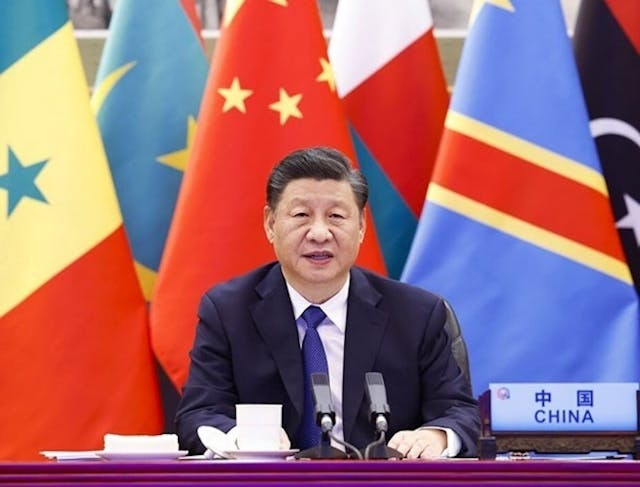11 月 29 日,國家主席習近平以視像方式在中非合作論壇開幕式上的主題演講,標誌着中國政府堅持對外合作及援助非洲國家的政策和決心。
向非洲提供10億劑疫苗
中國除了承諾向非洲國家提供 10 億劑疫苗以對抗迅速變異的新冠病毒外,還承諾在公共衛生、減貧惠農、貿易促進、投資驅動,以及數字創新等方面,加強與非洲國家的合作。
在公共衛生領域,為實現非洲 60%人口接種新冠疫苗的目標,中國將提供 10 億劑疫苗,其中 6 億劑為無償援助,4億劑以中方企業與有關非洲國家聯合生產等方式提供。 此外,中國將向非洲派遣1500名醫療隊員和公共衛生專家。
在大多數非洲國家屬於貧困的發展中國家,疫苗供應和生產不平等現象突出的情況下,中國在公共衛生方面的伸出援手,可以說是一項受歡迎的、具有社會政治意義的舉動。公共衛生屬於非洲國家普通民眾的基本需求,因此,中國提供更多疫苗的援助,對於非洲抗擊新冠病毒傳播和持續變異的艱巨鬥爭,是必不可少的。
在減貧惠農方面,中國將實施10個減貧和農業項目,包括向非洲派遣500名農業專家,在中國建立一批中非農業技術交流示範和培訓聯合中心,鼓勵中國機構和企業在非洲建設中非農業發展與減貧示範村,支持在非中國企業社會責任聯盟發起「百企千村」活動,提升非洲當地農民的生活水平。如果農業仍然是許多非洲國家的經濟支柱,那麼,中國在農業發展和現代化方面的援助,將是另一項具有積極意義的行動。
支持非洲建自由貿易區
在促進貿易方面,中國將為非洲農產品輸華建立「綠色通道」,加快推動檢疫準入程序,進一步擴大同中國建交的最不發達國家輸華零關稅待遇的產品範圍,力爭未來3年從非洲進口總額達到3000億美元。中國將提供100億美元貿易融資額度,用于支持非洲出口。中國將為非洲實施10個援助項目,包括同非洲大陸自由貿易區秘書處成立中非經濟合作專家組,支持非洲大陸建設自由貿易區。
第四個援助領域是投資驅動工程。中國未來3年將推動企業對非洲投資總額不少於100億美元,設立「中非民間投資促進平台」。中國將為非洲援助實施10個工業化和就業促進項目,向非洲金融機構提供100億美元授信額度,重點扶持非洲中小企業發展,設立中非跨境人民幣中心。同時,將免除非洲最不發達國家截至2021年年底到期未還的政府間無息貸款債務。中國願從國際貨幣基金組織增發的特別提款權中拿出100億美元,轉借給非洲國家。
繼續落實對非盟軍事援助
第五個援助領域數字創新工程。中國將為非洲援助實施10個數字經濟項目,建設中非衛星遙感應用合作中心,支持建設中非聯合實驗室、伙伴研究所、科技創新合作基地。中國將同非洲國家攜手拓展電商合作,非洲人民將可以透過互聯網銷售平台購買產品。
第六個援助領域是綠色發展工程。中國將為非洲援助實施10個綠色環保和應對氣候變化項目,支持「非洲綠色長城」建設,在非洲建設低碳示範區和適應氣候變化示範區。
七是能力建設工程。中國將為非洲援助新建或升級10所學校,邀請1萬名非洲高端人才參加研修研討活動,聚焦發展職業教育。最重要的是,鼓勵在非洲的中國企業為當地提供不少于80萬個就業崗位。
八是人文交流工程。中國支持中國公民組團出境旅遊所有非洲建交國。另一方面,將在中國舉辦非洲電影節,以及在非洲舉辦中國電影節,舉辦中非青年服務論壇和中非婦女論壇,促進中非人文交流。
九是和平安全工程。中國將為非洲援助實施10個和平安全領域項目,繼續落實對非盟軍事援助,支持非洲國家自主維護地區安全和反恐努力,開展中非維和部隊聯合訓練、現場培訓、輕小武器管控合作。
構建「中非命運共同體」
習主席11月29日的重要講話,是繼11月26日國務院新聞辦發表《新時代中非合作》白皮書後發表的。白皮書強調構建「中非命運共同體」, 表示中非要鞏固政治互信,深化各领域務實合作,為非洲和平與發展提供力所能及的幫助。白皮書還提到中非需要爭取國際正義,攜手應對新冠病毒,有效應對伊波拉出血熱和自然災害。

顯然,在中國崛起的時代,非洲在中國的地緣政治和地緣經濟戰略中佔有重要地位。中國發展模式的特點是強大的國家、快速發展的經濟、成功解決了普羅百姓的基本需求,對非洲許多政府和領導人仍然具有相當大的吸引力。儘管一些批評中國對非洲外交政策的人,認為中國似乎是一個「剝削」非洲資源的「帝國主義」國家,但他們對清政府統治下的中國遭受帝國主義列強侵略和經濟剝削的巨大痛苦完全視而不見。因此,如果批評者理解中國人所說的「己所不欲,勿施於人」,他們應該能夠體會到中國向非洲國家提供包括從經濟和公共衛生援助;從發展基建設施到數字經濟等各種援助方面,所作出巨大而真誠的努力。
布林肯訪非洲推銷美國
根據坦桑尼亞網站《公民》(The Citizen)11 月 29 日報道,中國駐烏干達大使館對最近有關烏干達無法償還貸款,將恩德培國際機場的控制權移交給中國的指控作出回應。大使館指出,這筆貸款是中國在 2015 年提供的。不過,該項融資協議被抨擊為「有毒條款」,規定烏干達的主權資產將被仲裁由中方接管;烏干達政府派代表團來華重新談判融資協議,但未能如願。中國駐烏干達大使館11月28日回應傳媒報道,稱中烏合作一貫秉持公開透明、平等互利的原則。
儘管中國駐烏干達大使館表示,中國支持減輕非洲國家的債務負擔,積極落實二十國集團暫緩最貧困國家債務償付倡議,但中國可能不得不以更加微妙、謹慎和外交的方式來處理這些「最貧困」國家的債務償還問題,並與提供有關貸款的中國內地銀行更好地協調。 否則,中非關係尤其是經濟方面的任何失誤,都很容易為外國批評者提供藉口,指責中國對非洲外交政策中的所謂「不公平」和「剝削」。
有趣的是,在中非合作論壇召開前10天左右,美國國務卿布林肯訪問非洲,視非洲為「重要地緣政治力量」,美國可以為非洲帶來實際利益,以抗衡來自中國的滲透和影響。 布林肯表示,「美國不會限制你們與其他國家的夥伴關係」,美國的做法將是「可持續、透明、價值驅動」的。 此外,他表示,其他國家的基建設施交易可能「不透明、強制性的、債務難以負擔,對環境具有破壞性,並且不一定讓實際生活在那裏的人們受益」的。
黑色大陸變了迷人新娘
或許更有趣的是,許多非洲國家領導人認為中國的對外援助是務實的,有利於非洲的發展。 正如尼日利亞外長奧尼亞馬所說,中國為非洲國家提供了必要的資金。 他補充說:「有時候,如果你是迷人的新娘,而且每個人都為你提供美妙的東西,這對你來說是件好事。」
歸根究柢,中國的對非洲的外交政策,無疑是出於在公共衛生、扶貧、貿易促進、投資、數字經濟、綠色發展、基建設施項目、人文交流等方面,以及為維護和平與安全,為非洲國家發展作出貢獻的良好意願。然而,在中美地緣政治背景下,非洲已成為雙方較量和競爭的熱點。最重要的是,批評中國對非洲政策的人,忽視了中國歷史上,清朝遭受列強欺凌的歷史。中國汲取了歷史教訓,渴望以善意幫助非洲國家。儘管如此,中國企業、銀行和幹部如何以更微妙、更有技巧和更符合外交的方式,實施中國對非洲的援助政策,藉以說服那些對中國歷史經驗視而不見的批評者,仍然是一個挑戰。
Understanding China’s Foreign Policy toward Africa
An important speech delivered by Xi Jinping, the President of the People’s Republic of China (PRC) at the opening ceremony of the China-Africa Cooperative Forum on November 29 marked the determination of the PRC government to persist in its cooperative and foreign aid policy toward African states.
Apart from the PRC pledge to deliver 1 billion doses of vaccines to African states to combat the rapidly mutating Covid-19 viruses, China vows to enhance cooperation with them in the projects of dealing with public health, agriculture and poverty alleviation, trade, investment, and digital innovation (Wen Wei Po, November 30, 2021, p. A10).
In the realm of public health, to realize the objective of achieving 60 percent of the African population receiving vaccination against the variants of Covid-19, China is going to provide 1 billion doses of vaccines in which 600 million doses would be provided free while 400 million will be produced jointly by the Chinese enterprises and African cooperative partners. Moreover, the PRC will send 1,500 medical experts and team members to Africa.
Under the circumstances in which most African states are belonging to an underprivileged developing world in which the inequality of vaccine provision and production can be prominently found, China’s helping hand in the aspect of public health is arguably a welcome and socio-politically important move. Public health belongs to the basic needs of ordinary people in African states and, as such, the PRC’s aid in the provision of more vaccines will be indispensable for Africa’s difficult combat against the spread and ongoing mutation of Covid-19.
In the area of poverty alleviation, China will initiate ten projects, including the dispatch of 500 agricultural experts to Africa, the establishment of a technical exchange demonstration and training centre in China to nurture a group of African agricultural specialists, and the encouragement of Chinese enterprises to fulfil their corporate social responsibility to set up model villages to elevate the standards of local peasants in Africa. If agriculture remains the backbone of many African states, the PRC assistance in agricultural development and modernization will be another progressive move with positive impacts.
In the realm of promoting trade, China will set up a “green channel” for Africa’s agricultural products, accelerate the procedures of inspecting the health conditions of imported animals, and expand the zero custom tax privilege to more underdeveloped states in Africa. The target is to help importing US$300 billion from Africa in the coming three years. China will also provide US$10 billion as a trade capital to help boost African exports. The PRC will also contribute to 10 aid projects, including the establishment of a Sino-African cooperative expert group under the secretariat of the China-Africa Free Trade Zone.
The fourth area of aid is investment promotion. China will set up an investment fund of not less than US$10 billion for a promotion platform of Sino-African civilian investment, helping small and medium enterprises in Africa to develop while setting up a cross-border Renminbi centre for China and Africa. The PRC will exempt “the most underdeveloped” states from paying any debt by the end of 2021. Instead, China will get out US$10 billion from the International Monetary Fund as loans to be given to African states.
The fifth area of aid is digital innovation projects in which ten economic items will be the concrete inputs from China. A Sino-African Satellite Distance Digital Applied Centre will be set up, together with other related laboratories, research centres, and innovative technology centre. Under these circumstances, Africans will be able to buy their products through Internet buying and selling service platforms.
The sixth area of aid is green development projects in which China will embark on ten green and environmental projects that deal with climate change. An idea of building up an “African green wall” is proposed, together with the establishment of a low-carbon demonstration zone.
The seventh area is construction projects in which the PRC will build up 10 schools and invite 10,000 African high-quality experts to participate in research and study activities, focusing on the development of vocational education. Most importantly, the Chinese enterprises in Africa will be encouraged to provide not less than 800,000 jobs for the local people in Africa.
The eighth area is human exchange projects in which China supports the Chinese citizens to form themselves as tour groups to visit African states. On the other hand, the PRC will hold Africa films festivals in China and Chinese films festivals in Africa. Sino-African youth fashion forums and women forums will be arranged to stimulate cross-border human exchanges.
The ninth area is peace and security projects in which China will participate in ten such project items. China will continue to provide the necessary military aid to African states, support African states to set up anti-terrorist and security forces, initiate joint training between China’s peace-keeping force and its counterparts in African states, and to cooperate in the usage of small armaments.
President Xi’s important speech on November 29 was made after the publication of a State Council document on “Sino-African Cooperation during the New Era” on November 26. The document emphasizes the importance of constructing the “Sino-African common destiny of the mankind,” saying that China and African will have to deepen political trust, economic cooperation, social collaboration, human exchanges and joint development of the efforts at promoting peace and security (“Sino-African Cooperation in the New Era,” www.mod.gov.cn). It also mentions the need for China and Africa to fight for international justice, to combat Covid-19, to win the battle against Ebola Haemorrhagic Fever, and to tackle natural disasters.
Clearly, in the era of the China rise, Africa occupies a central part in the PRC’s geopolitical and geo-economic strategy. The China model of development, which is characterized by a strong state, rapid economic development, and the success in dealing with the basic needs of the ordinary citizens, remains quite attractive to many governments and leaders in Africa. Although some critics of the PRC’s foreign policy toward Africa have argued that China appears to be an “imperialistic” state “exploiting” the African resources, they have totally turned a blind eye to the fact that China under the Qing dynasty suffered tremendously from foreign imperialism and foreign economic exploitation. As such, if critics understand the Chinese saying that “Do not do to others what you would not want them to do to you,” they should gradually appreciate the PRC’s tremendous and sincere efforts at providing various types of aid, ranging from economic and public health, from infrastructure development to digital economy, to the African states.
According to a report from Tanzania (The Citizen, November 29, 2021, in www.thecitizen.co.tz), the PRC Embassy in Uganda reacted to a recent accusation that Uganda risked surrendering the control of the Entebbe International Airport to China over a loan that could not be repaid by Kampala. The loan was made by China in 2015, but the loan agreement was criticized as having a “toxic clause” stating that Uganda’s sovereign assets would be exposed to being taken over as arbitration awards. The Uganda government sent a delegation to China to renegotiate the loan agreement, but it failed to do so. The PRC Embassy in Uganda on November 28 reacted to the media reports and asserted that China-Uganda relations often stick to the principles of openness, transparency, equity and mutual benefits.
Although the Chinese Embassy in Uganda said that China is implementing the G20 Debt Service Suspension for poorest countries, the PRC may have to deal with the problem of debt payment of these “poorest” countries in a more delicate, careful and diplomatic way, together with better coordination with a mainland Chinese bank that provided the loan concerned. Otherwise, any misstep in managing China’s relations with Africa, especially in economic aspect, would provide an easy pretext for foreign critics to point to the so-called “inequity” and “exploitation” in China’s foreign policy toward Africa.
Interestingly, about 10 days before the China-African Cooperative Forum was held, the United States Secretary of State, Anthony Blinken, visited Africa and considered the continent as a “major geopolitical power” where the US role can be expanded to counter the penetrative influence from China. Blinken remarked that the US “does not want to limit your partnership with other countries,” and that the US approach will be “sustainable, transparent and values-driven” (www.france24.com, November 19, 2021). Moreover, he said other nations’ infrastructure deals “can be opaque, coercive, burden countries with unmanageable debt, are environmentally destructive and don’t always benefit the people who actually live there.”
Perhaps interestingly, many African state leaders see China’s foreign aid as practical and beneficial to the development of Africa. As the Nigerian Foreign Minister Geoffrey Onyeama said, China provided the necessary funding for African states. He added: “Sometimes it’s a good thing for you if you’re the attractive bride and everybody is offering you wonderful things (Ibid.).”
In conclusion, China’s foreign policy toward Africa is undoubtedly driven by its good intentions of contributing to the development of African states in various aspects, including public health, poverty alleviation, trade promotion, investment, digital economy, green development, infrastructure projects, human exchanges and the maintenance of peace and security. However, in the context of US-China geopolitics, Africa has become a hotspot for their rivalry and competition. Most importantly, critics of China’s Africa policy have ignored the history of China where the Qing dynasty was under the onslaught of foreign imperialism. China has learnt its historical lesson and is eager to assist African states with good intentions; nevertheless, it remains a challenge for the Chinese enterprises, banks, and cadres to implement the PRC aid policy toward Africa in a more delicate, skilful and diplomatic way so as to convince its critics, who have turned a blind eye to how China’s historical experiences have been shaping its recent and current policy toward the developing and underdeveloped states in Africa.
原刊於澳門新聞通訊社(MNA)網站,本社獲作者授權轉載。



































